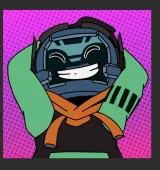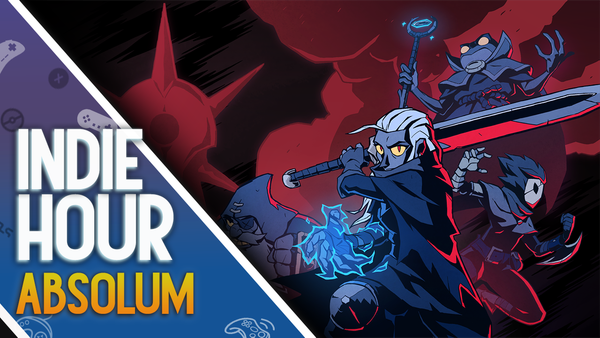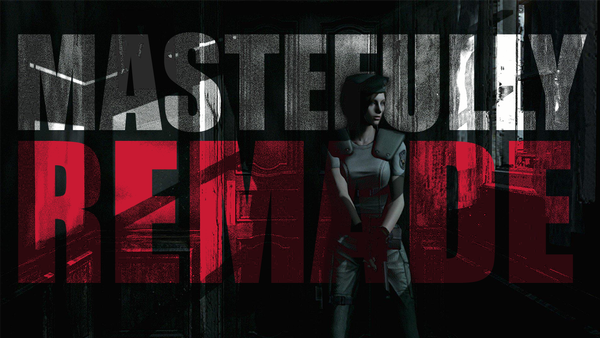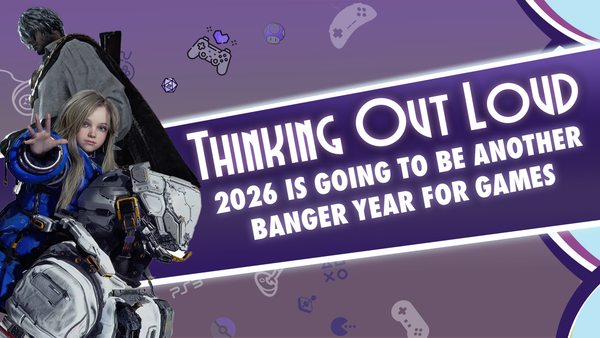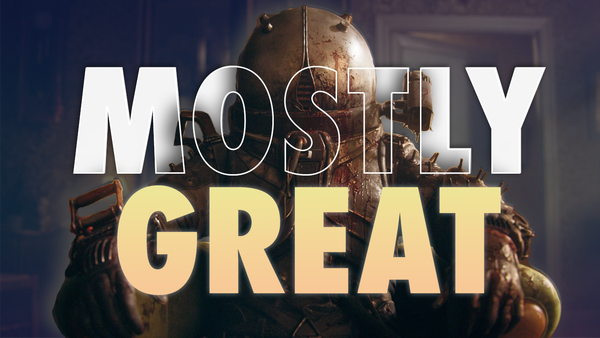Metaphor ReFantazio: The Perfected Craft of the Modern JRPG (Review)

Table of Contents
Introduction
There is something magical about fiction, the influence that it has on us the stories the meaning and ideas that are extrapolated from their substance and subtext. Some works of fiction can be prolific or have the foresight to look into the future or be introspective on the present.
Whether it is your favorite movie, anime, book or video game there is a message and an idea, that can invoke a particular feeling and influence the way we perceive our world. Metaphor ReFantazio tells a story that explores and promotes the ideas that fiction can project into the world and how fiction can provide a sense of hope and influence to build a better world.
What's more interesting is the influence that fiction and fantasy as had on Atlus as a studio, given their history predominantly with stories that take place in a contemporary setting and this new venture out into the world of fantasy. Metaphor ReFantaszio is in many respects when first revealed and teased was meant an approach for Katsura Hashino and the writing team to rethink and reimagine fantasy, and in most ways I do believe that they have succeed.
Metaphor ReFantazio is an incredible RPG that tells a captivating story that carries a strong sense of weight, an interesting and compelling cast of characters, and a gameplay loop and combat system that combines the best elements of the SMT and Persona series, with its own fresh blend of new ideas.
It is an incredible feat for Atlus and for video games in 2024, that never ceases to feel meaningful in how it asks the player to utilize their time, and in turn the things that it provides the player to do. There is a robust and customizable approach to combat, and the new archetype system shakes up the way the game handles progression in a way that feels flexible but strategic for how players choose to maneuver there fights. The world of Euchronia is rich world full of history and conflict and it shines through every facet of this game and is an absolute masterpiece and statement that Atlus are at the top of their game, no matter the setting or style of game they set out to make. It should be no surprise to you by this point that I loved Metaphor ReFantazio, and with tons of different games releases around the end of this year, I want to tell you why out of all these games, you should absolutely give this one a chance.
Development
So before I dive into the nitty gritty of the different aspects of Metaphor ReFantazio's contents, I believe that it is important to touch on the game's development, as it is a big part of what I think brought this experience to life. The ideas and concepts that shaped this game from the early stages carry across in to the final product in ways that I feel do provide some context to the Metaphor's importance and what it achieves.
The development for Metaphor ReFantazio kicked off shortly after the Japanese release of Persona 5 back in 2016. Katsura Hashino who was the creative lead behind the modern Persona games, and cult classics like SMT 3: Nocturne made the choice to step back from these established franchises and start up a new studio called Studio Zero under the Atlus umbrella to take on a new game entirely.
Hashino wanted to pivot towards a more fantasy leaning RPG with the name Project Re:Fantasy. Hashino explained his intentions were to create an RPG that was rooted in the aesthetics of a traditional fantasy. The concept of fantasy was a major point of discussion during the games development, and so much so that Studio Zero's attempts to step away from the the worlds of Persona and SMT and dabble in the realms of fantasy seeped into the innerworkings of Metaphor's narrative and how it plays with the power of fiction.
Hashino would bring with him many of the talent from P-Studio such as Shoji Meguro the mind behind the music of Persona 3 through to Persona 5, and Shingenori Soejima character designer for various SMT entries, and Art director for Persona 3 through to Persona 5.
Story
Story Overview
The story for Metaphor ReFantazio takes place in the fantastical world of Euchronia that is comprised of eight major tribes, and is engulfed in turmoil of fear, anxiety and divide. With the death of Euchronia's King, the world is on the verge of a new dawn as the race for a new king emerges and one that will be selected on the favor of the people.
Metaphor puts you in the shoes of a player-named traveler who is on a journey accompanied by his fairy handler Gallica to rescue rescue the prince, the protagonists childhood friend and the rightful heir to the throne, who has been struck with an ill-fated curse. Metaphor's story unfolds with many plot-threads telling an expectational globetrotting adventure across the world of Euchronia, to protect the throne, and save the prince. Metaphor's journey, exploration and world-building in many ways harkens back to those JRPG's of old, with unique cities, cultures, and wildlife that make this universe incredible to get invested into, and in large part delivers. In terms of time to complete this story, and how it presents its story, it is still an Atlus game and will run you 80 hours to see it to its conclusion, but every second was worth it for me.
Now I will be discussing the themes for Metaphor ReFantazio and whilst I won't be spoiling any major plot points or story beats for the game I will be discussing themes for the story, which some may consider spoiler territory. So I'll put a time-stamp here for you to skip to if you want to avoid all spoilers.
Themes
The Power of Fiction
The first major theme and the underlying thread-line of Metaphor ReFantazio's narrative explores idea of power, and how one who wields power can choose and dictate change. There are many aspects of power that are called into question throughout Metaphor.
On a side note Metaphor's world and order to me shares similar ends to the Shin Megami Tensei series having two major forces of ideals being pitted against one another through the lens of Law and Chaos. There are two major parties which are a guiding for for the people, that fall under this umbrella of ruling, with the protagonists ideals falling somewhere outside of this spectrum.
The major aspect of this theme and the major thread-line that ties all of Metaphor ReFantazio's themes together is the power that is fiction and how fiction can drive and influence change. The main party find their source of power through ideas conveyed through fiction, ideas that can spur hope in people. Throughout Metaphor's lengthy story there is one key word that you'll hear repeatedly, and that is the word utopia, which we'll talk about in greater depth shortly.
This word utopia, this book that fantasizes and ponders on a better idealistic world is the parties source of belief and the world and ideal that they fight for.
From the moment the prince shared with our protagonist this fable of a world that thrived as a utopia. The power of fiction took hold, and the depiction of a world free of discrimination, divide and class segregation would be fought for to become reality.
However, this lofty ideal of a world that is a utopia whilst is fuel and hope for a better world, there is a question that is this perfect world even attainable?
Fiction even if unattainable can be a source of power that can carry a message, and even if unattainable in practicality can inspire and motivate better outcome to a world stricken with fear and anxiety.
The depiction of fantasy and what we can take from a story is also something that the power of fiction carries, the way that we can perceive the message, how we choose to shape a story.
Utopia
From the early stages of Metaphor ReFantazio development their was one keyword that echoed throughout devising the narrative and overall setting for Metaphor was "utopia". The concept of Utopia makes several appearance throughout the narrative and is used to explore the dissonance between an ideal world, a fantasy world, and the real world. It ponders and asks the question are goals such as achieving equality attainable. It depicts the contrast between an ideal world, a fantasy, and reality, providing introspection on ourselves and our reality through the view of a fantasy, a utopia.
The book the The Traveler and Prince find their source of influence and idealism from is from your Velvet Room equivalent companion who resides in a realm called Akadeimia named More. This character's name bares some significance as one of the early modern humanists who was well known for his writings named Utopia.
This idealistic conquest for a utopia is juxtaposed brilliantly to the world of Euchronia a world that is engulfed in racial prejudice, class discrimination and malevolent theocrats. During the development of Metaphor, Hashino and the writing took the various perspectives of topics revolving around justice and reason into consideration an wanted to cultivate a world where the characters did not adhere to strict values of morality. This would allow the team to deviate from the clear-cut characters of virtue from the Persona series.
With this ability to deviate from a clear-cut concept of morality, it would allow the team to explore the values of what people believe and explore the subjective nature of ones perception of a utopia. This is portrayed by the various candidates, although some may be comedic in intention they are all representative of a different view or perspective of a better world. Some examples being a world built on ascetics and beauty, a world governed by religion, those who value the lives of wild-life, and you start to see different ideals that aren't representative of everyone, and in some respects may be a selfish perception of a utopia, and to me it asks if the concept of a perfect world, a utopia is even something attainable.
Anxiety and Inner Resolve
Anxiety is a the third and final pillar core theme of this video that I would like to talk about with regards to Metaphor ReFantazio's story. The concept of anxiety is used to depict control, what has a stranglehold over people. Anxiety is a big major antagonist. It holds people back preventing them from moving forward towards that better future, and whilst a world may never end up as a utopia, anxiety breeds fear, and destruction. Metaphor on a symbolic level shares a similar characteristic to the Persona series, and that is in how it handles the players awakening to there new power. Where the pact that the protagonist in a persona is making is tied to the central theme of that particular game, Metaphor's theme will see each party member awaken to the power of the archetype through ripping their heart out, abandoning their fears, uncertainties, insecurities, and making a pact to confront anxiety, and this violent and graphic depiction is a statement of the separation of their resolve and their anxiety.
Many look at Metaphor and see a political melodrama, which is very much the surface level of what Metaphor is. On a more micro-level it is exploring the unrest and inner anxieties of the people, what causes the divide and how one a true king and leader would look to mend and build bridges amongst these different tribes. The team created these different tribes to explore that idea of how different people clash, how different people from a different experience collide and how these inabilities to co-exist perpetuate feelings of anxiety.
The theme of anxiety is the contrast to the concepts of idealistic concept of a utopia. The ideals of a utopia breathe hope, optimism and a world were people have a resolve to move forward. Anxiety is something that serves to leave people stuck in place, a world where people are lost, and is ultimately the core premise that you're fighting against in this adventure.
Gameplay
Combat
Turn-Based Combat
Metaphor ReFantazio's combat is primarily focused around turn-based encounters, and inherits more of the foundations from SMT with the turn actions which are a number of actions afforded to the player. When exploiting an enemies weakness in Metaphor this gives this refunds the player an action point allowing them to make another move. For those jumping into Metaphor from Persona, hitting an enemy weakness doesn't stun the enemy nor does Metaphor have All-Out-Attacks. However, Metaphor's combat in many ways feels more tactical and does offer up its unique alternative with this in mind.
Another addition here in Metaphor that breaks tradition from other Atlus games is that there is no game over if the protagonist is KO'd in combat, which I personally welcome. Overall if you've played an Atlus RPG before whether it be Persona or SMT, you'll be familiar with many of the core pillars of combat, and the overall approach to turn-based combat is intuitive, and engaging throughout the experience.
Synthesis
Metaphor ReFantazio doesn't only retread and recontextualize existing components of combat, but also introduces new mechanics that spice up the combat, through the use of Synthesis Skills. These skills, are group attacks where each party member can team-up with another party member and execute a more powerful attack. Synthesis Skills will require more action points from the party, however, similarly to how I mentioned exploiting a weakness refunding player actions, the same rule is applicable to Synthesis skills too. There are over 50 different types of Synthesis skills that can be used and they come with their own animation that are eye-melting and oozing with style, but are bespoke to the particular Archetype which we'll discuss later in the video each party member has assigned.
Party Formation
Metaphor also has party formation which has made an appearance in many different RPG's allowing you to assemble different party members in the Front Row or Back row and position of where these party member are place will determine the amount of damage dealt as well as the amount of damage taken. There are also particular Archetypes which can only operate or effectively execute their abilities from a particular row too.
Free-Flow Combat
One of the biggest issues that many who try to get into turn-based RPG's face is, well, the turn-based combat, but more explicitly the repetition of that combat and how random encounters, and turn-based often clash and can wear down an experience.
Metaphor's approach to lower level enemies is a great addition and the way that it accomplishes this is through providing Free-flow basic melee combat where you can attack the enemies and defeat them more effortlessly without initiating a turn-based encounter and I feel like this removes the tedium that can be found in other turn-based games, and instead saves the challenge and strategy for enemies of your level or higher.
This mode of combat makes re-exploring old dungeons or facing enemies that are under your level still something that you'll have to engage with but removes the tedium and overall draining resources and time, mindlessly felling the same foes. It's an aspect of these games that I do feel is a big turn off for many people, but I think is something that Metaphor handles extremely well, keeping dungeons refreshing and the encounters where enemies are on or above your level challenging.
Another thing that this aspect of combat provides for enemies that are at the players level is the ability to stagger the enemy, which will kick off the turn-based encounter with your party in an advantaged state allowing them to attack first and even have a party member attack the enemy party before combat is initiated. On the flipside, these enemies will attack and chase you and if they land a hit on you, they'll throw your party into a disadvantaged state in combat.
Exploration
Main Dungeons
The exploration for Metaphor ReFantazio follows the same formula and structure to that of the Persona series, where there will be a main dungeon allocated to the player to explore and is mandatory to complete to advance the story. These main dungeons also run on a deadline, much like in Persona with regards to the timeframe it allows the player to complete them within. It creates a flow, a rhythm that becomes the bread and butter for this experience. The main dungeons of Metaphor are all distinct interesting, and offer a versatile approach and style to how they are completed that keep the game feeling refreshing throughout the 80+ hours you'll be engaging with this games story. But it isn't just the means of exploring the dungeons and progressing Metaphor's story, that is only one facet of this games loop.
Managing Your Time
Once Metaphor sets you free this game takes the best aspects of Persona and allows you to work on the day and night clock of Metaphors time management system which is at the core of this experience.
The open world traversal and time management is excellent. It takes the time-based systems of the Persona games, but reshapes the way in which the you utilize your time to fit within the context of this fantasy adventure. Where Persona would be having you prioritize your daily life in a more grounded context, here in Metaphor given you're exploring the broader world of Euchronia. So it'll ask the player to manage their time in some familiar ways to Persona such as choosing time to level up your social stats which are called Royal Virtues, strengthen your bonds which is the social link system, but also complete different requests which would put another dungeon or town on the map. When setting out to visit side dungeons which is advised you do, these adventures will factor into the time management side of the experience requiring the player to plan ahead and factor in the travel time to factor into the equation.
Side Dungeons and Requests
One thing that I feel that Metaphor Refantazio executes really well is its approach to side content, but more explicitly side dungeons. I'd argue that this is one aspect of the side experience that I feel Metaphor handles more tactfully than the Persona games even, and I'm happy to explain how. You see in Metaphor as you settle in each of the games major cities you'll have these various dungeons that open up for you to complete, either through bounties or requests made by people in the city. These dungeons are interesting and varied in their visual presentation, and even the types of puzzles and labyrinth type structure that they're designed to be. But more importantly I feel the variation of these smaller dungeons really does break up and differentiate the gameplay experience and provides a greater sense of breadth to the exploration in a way that only feels possible in the setting and world Metaphor lends itself too. In comparison to Mementos or Tartarus, exploring these different dungeons in Metaphor feel more smaller and bite-sized, but more memorable and varied.
Gameplay Systems
Archetypes
Now I'd like to talk about Archetypes, which are the key and core driver of progression that becomes more and more expansive as you progress through this game.
If you are familiar with SMT or Persona then you'll be familiar with the style of monster collector gameplay present in those games where you're collecting stronger demons and fusing them together to make more formidable party composition, that can exploit enemies weaknesses, buff the party, debuff the enemy.
I bring this comparison to the forefront, because whilst Metaphor may on the surface look similar with these cool Archetypes that cast similar spells and exploit enemy weaknesses to get an advantage. However, fundamentally and foundationally Archetypes are obtained, and operate in an entirely different manner to Demons or Personas.
Archetypes are in their most simplest form operate like a class or job from many of the more traditional RPGs. Where Archetypes differ is in the flexibility and in there evolution, see every party member is able to access every single archetype, and through mastery of a particular archetype provides access to the next evolution in its respective lineage. But some classes will have a pre-requisite of mastering a certain set of archetypes, rewarding and incentivizing players to explore as many different playstyles available.
Some examples, of this are how mastering the wizard Wizard will enable a party member to explore the Magic Knight Archetype which is a branch of the Knight lineage. It provides an expansive set of playstyles that merge together and reward the player for exploring and advancing different lineages of Archetypes.
Another feature that expands the way you interface with archetypes is how you're able to inherit different skills you've unlocked across the archetypes you've been mastering. You can assign skills to the current Archetype that you have equipped, from any of the prior archetypes that you have unlocked skills for meaning you can take mage spells from the mage archetype, healing spells from the healer, and apply them to the warrior class.
The progression of Archetypes is something that we'll dive more into how it works later, but essentially much like how the social elements particularly the social links referred to as bonds here in Metaphor, are the key to progressing and levelling up the overall lineage for an archetype.
Royal Virtues and Social Links
Royal Virtues
Earlier in the review I discussed the way that Metaphor legits you manage your time with regards to tackling main dungeons, side dungeons, and the overall time management system of this game. So I want to talk about the social aspects of the Metaphor experience, which for those who have played a Persona game before will be familiar with.
So firstly, when you aren't exploring dungeons, completing requests or progressing the story, you'll be exploring the many different cities of Euchronia you'll be able to take part in many different activities that will strengthen your cause. The main thing that you'll be looking to increase is your Royal Virtues. These Royal Virtues are five different categories of things such as Courage, Eloquence, Imagination and increasing these virtues can provide you the access to partake in different activities, but it can also be a barrier to progressing the various bonds that you'll want to progress.
These Royal Virtues ultimately will intersect with how you engage with the various activities available and are in some respects a soft skill-check to unlocking and completing different bonds meaning that you'll need to effectively manage the allotted time that you have to upskill say your eloquence before you can converse and progress a particular bond. Where in Persona they have you visiting a restaurant or working part-time, I feel the activities in Metaphor, do provide an interesting backdrop to the culture, politics, and local festivities of the different regions you visit, which makes for a nice change of pace too.
Follower (Social-Links)
Now I would properly like to discuss the Follower bonds in Metaphor ReFantazio which operate similar to the social links found in the Persona series. The way that Bonds work here in Metaphor is a multi-faceted answer, first and foremost they serve as a substory that will introduce a character of interest that dives into a particular sub-theme of Metaphor's narrative. These stories are divided into eight parts and when completing each iteration of one of these characters story, you'll strengthen your bond with this particular character who is tied to particular archetypes lineage, and strengthen this bond on a narrative level, you're also in-turn on a gameplay level unlocking new perks and unlocks tied to this particular lineage, meaning that you're unlocking new inheritance slots, archetype lineage evolutions, and other perks that enhance the combat side of the equation, meaning that no matter how you spend your time you're effectively improving and growing, as well as getting to explore more of the content on offer.
This is something that I feel like the Persona series has always been able to manage so gracefully, and it is something that I feel Metaphor is able to do exceptionally too. I would argue there is less free time overall in Metaphor compared to Persona, but what Metaphor does so well is the way that it concentrates and curates this content into a more compact version of the Persona experience that feels tight, rewarding and satisfying. If you spend time with a Follower, you will strengthen that bond, and will receive a progression benefit, you explore a dungeon, you will level up, unlock new gear and rewards to enhance the experience.
Visuals and Sound
Visuals
The visuals for Metaphor ReFantazio are stylistically stunning with Atlus being able to create some truly incredible cities, landscapes and societies and with the game now not having the restraints of a grounded modern day setting, it feels like the creative teams was given full rein to create a truly incredible world. With Shigenori Soejima returning to do the character designs, it is no surprise how each of these party members, races and characters look so incredible.
The designs for many of the different enemies in this game too are absolutely top notch too drawing influences from things such as the surrealistic artworks of Hieronymous Bosch, and every time you will encounter a boss encounter, you'll be absolutely in awe at the size, scale and overall presentation of these enemies.
The easiest thing to acknowledge that everyone would have seen as a standout since the first trailer for the game dropped is the UI for this game, whether it is increasing your bond with a party member, selecting the choices that you want to make during combat or pausing the game for a moment of respite. The visual presentation is oozing with style but is still comprehensive in a way that doesn't distract from its functionality. Seriously this games universe is brought to life in every facet of its presentation, the eight different tribes are all distinct in their presentation, and the way they're represented reflects accurately their place within the world.
Sound
Now onto the sound for Metaphor ReFantazio and the OST see's the return of Shoji Meguro as the lead composer for the score and soundtrack of Metaphor ReFanatizo. Man, is a huge departure from the acid-jazz inspired bops of Persona 5, the electric or metal blends of SMT 4, with a more fantastical soundtrack that is versatile from whimsical or introspective fantasy sounds, to more triumphant, ominous or epic chanting pieces that resemble some of the musical sound of Strange Journey. I think that it can't be understated how versatile yet fantastical this soundtrack is, I feel like it really does carry as much weight for creating the unique and distinctive atmosphere of Metaphor's world, as the visuals and world building.
Whilst the soundtrack for Metaphor ReFantazio is a large component of the atmosphere, I feel that the vocal performances for the cast of this game help to convey the sense of feeling and emotion in the writing. I think characters like Strohl and the voice performance by Stewart Clarke was just one example that springs to mind. But the casting and vocal performances for this game are great and truly in the realm of visuals and sound presentation, Atlus and Studio Zero have absolutely nailed it and brought every region, landscape, character, and personality to life in a way that will be remembered among many of the greats.
Conclusion
Metaphor ReFantazio is a remarkable experience in every regard and is a statement that not only is there still a demand for turn-based RPG's, but more broadly that this fantasy RPG still is something that people are hungering for. It tells a excellent narrative, that is filled to the brim with subtext and undertones, that only become more perceptible as the journey unfolds. The world of Euchronia is brimming with history, culture, conflict and character and this globetrotting adventure for the throne is one that is sure to invoke some sense of wonder as it's narrative and world unfold before you.
For the team at Studio Zero and more broadly Atlus, it is a success that shows the learning of both Shin Megami Tensei and Persona and what makes these types of experiences so engaging maps on more broadly to these different ideas and worlds that they envision and that this route of exploring something new has created a universe that has for me now become just as beloved, and Metaphor ReFantazio has enshrined itself as another pillar alongside SMT and Persona, in their excellent portfolio of video games.
The hardest thing I've had to do surrounding this game, is put off my second playthrough to write this review, I've been loving this game and it's truly a beautiful game that is a compact and more tightly experience that encapsulates all the social elements of a Persona game, in ways that always feel rewarding, combat that can feel satisfying with the turn-based actions of SMT, and the brand new archetype progression system which makes combat and playstyles always remain refreshing and diverse over this 80 hour epic.
Metaphor ReFantazio is a fantastic video game, and I absolutely recommend this game, whether you're a Persona fan, Atlus fan, or even a fan of the JRPG's of old, Metaphor has something for you. The world of Euchronia and the race for the throne, is one that will be unforgettable, and it is for that reason that I believe that Metaphor ReFantazio is almost certainly my Game of The Year and one that you must play.
